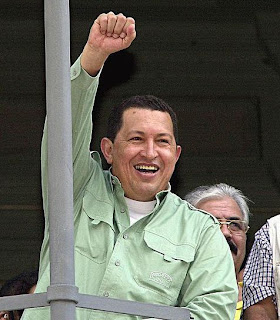 |
| Tests proved this was Bolivar's skeleton - but not what killed him. |
Nearly 200 years later, El Libertador is still a political football.
 |
| Simon Bolivar, murder victim? |
The move produced lots of ridicule because under Chávez Venezuela has suffered one of the world's highest homicide rates, and the president has paid little attention to the problem.
Chávez isn't alone in disputing the TB theory. Last year, an expert at Johns Hopkins University concluded that Bolívar's symptoms matched those of arsenic poisoning - but pointed out that back in those days arsenic was used as a medical treatment and was often in drinking water.
The dispute over Bolívar's cause of death seems to represent the social and national tensions in the region's politics. Chavéz often rails against the wealthy and 'oligarchs,' whom he now suspects of killing Bolívar. Venezuela's leftist government and Colombia's conservative government have experienced repeated tensions. And so the fact that the Caracas-born Bolívar died in Colombia produces convenient villians for Chávez. In contrast, Francisco de Paula Santander, Bolívar's great political rival, whom Chávez has suggested murdered Bolívar, was born in what is today Colombia.
Now, the results of the post-, post-, post-mortem autopsy are in - and they don't help.
Venezuela's vice president said the analysis had confirmed that the remains belong to Bolívar - but that the cause of death wasn't clear.
 |
| Hugo Chavez, a new Bolívar? |
Perhaps this is a case of what psychologists call 'projection.' Chávez sometimes seems to believe himself to be Bolívar's reincarnation, and he has often announced alleged plots to assasinate him - altho he's almost never offered evidence.
There are other parallels. Towards the end of his life, Bolívar wanted to be made president-for-life and even declared himself dictator. And during his 12 years in power, Chávez has become increasingly authoritarian and sometimes said that he intends to rule for another ten or twenty years.
By Mike Ceaser, of Bogotá Bike Tours




No comments:
Post a Comment